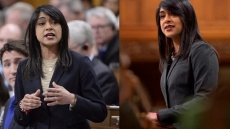Christy Clark says the results of Tuesday's British Columbia election that produced a minority government for the first time in 65 years is "the beginning of something very different."
Voters have sent a clear message they want political parties to find a way to work together, said the Liberal leader after a roller-coaster evening of flip-flopping election results.
Clark, 51, told supporters early Wednesday she intends to remain premier despite coming one seat shy of the bare minimum 44-seat threshold needed to form a majority government.
"British Columbians did tell us tonight that they want us to do some things differently," Clark told hundreds of supporters who had gathered in downtown Vancouver to watch the election results come in.
"They want us to work together. They want us to work across party lines. And they want us to find a way to get along so that we can all work for the province that all of us love so very, very much."
Clark's Liberals won 43 of the 87 seats in the legislature, while the NDP had secured 41. For the first time in provincial history, the Greens expanded their seat count from one to three, which gives the third party the balance of power.
Many swing ridings were won with small margins, so the final seat count could shift after absentee ballots are tallied and judicial recounts are conducted.
"Voters always know best. And they reminded us tonight that we are far from perfect," Clark said, adding that she was willing to work with the other parties to govern.
"They reminded us that we need to be humble. But it's also our job to always remember who it is that we serve and that we need to stay focused on the things that matter to ordinary British Columbians."
A party official said Clark had spoken with Green Leader Andrew Weaver and that the two party heads have a proven track record of working together.
This election was Clark's second as premier. She was chosen as leader of the Liberals in 2011 and staged a come-from-behind victory in 2013, the Liberals fourth consecutive majority.
Clark was first elected to the legislature in 1996 and became deputy premier and education minister after the Liberals' landslide victory in 2001.
In 2005, she left politics to spend more time with her family, but still made a failed bid to run for Vancouver mayor the following year. She also hosted a radio talk show on Vancouver station CKNW.
The Liberals ran a campaign during this election that focused on economic growth and job creation, billing themselves as the stable hand on the tiller and the most responsible stewards of the provincial economy.
BRITISH COLUMBIANS VOTED FOR A CHANGE IN GOVERNMENT: NDP LEADER JOHN HORGAN
VANCOUVER — At the end of a 28-day campaign where John Horgan campaigned for change, the leader of British Columbia's New Democrats was ready to claim victory on Tuesday night despite finishing slightly behind the Liberals.
Speaking to hundreds at Vancouver's convention centre, Horgan said the campaign will go down in history as transforming the province.
"British Columbians voted today to get big money out of politics. British Columbians voted today for proportional representation. British Columbians voted for action for action on climate change. And they voted for an economy that works for everyone, not just those at the top," he said.
The party won 41 seats, but there are still absentee ballots outstanding and there may be recounts, including Courtenay-Comox on Vancouver Island where NDP candidate Ronna-Rae Leonard won by nine votes. The Liberals won 43 seats and the Green three as B.C. elected its first minority government since 1952.
Party leader Andrew Weaver wasn't giving any indication which of his rivals would get support from the Greens to form a minority government.
The New Democrats had 35 seats when the legislature was dissolved last month.
They picked up some key ridings across the province, including Surrey-Fleetwood where Jagrup Brar defeated cabinet minister Peter Fassbender.
Horgan handily won his own riding of Juan de Fuca, where he was first elected in 2005.
The 57-year-old leader told the crowd this election is special for him.
"This is one of the most humbling moments of my life. I have enjoyed every single minute. I do not regret a single moment," said Horgan, who was acclaimed the party's leader in 2014.
The NDP ran on a promise to make life more affordable for British Columbians by scrapping tolls on two busy bridges in Metro Vancouver, implementing $10-a-day childcare and creating an annual $400 subsidy for renters.
"We can't afford four more years of (Liberal Leader) Christy Clark," Horgan said on the campaign trail.
The Liberals accused the NDP of failing to explain how they would pay for their campaign promises. Horgan said funding for the plan was sound.
The NDP's platform proposed raising taxes on high income earners and corporations, and creating a new levy for housing speculators.
Horgan often took swipes at Clark during the campaign, accusing her of putting the interests of wealthy donors ahead of most British Columbians.
But he was also asked to defend his demeanour in a televised debate when the moderator asked if he had anger-management issues.
Horgan responded by saying his anger comes from government inaction on a range of issues, including under funding in schools and a lack of support for children in care.
The New Democrats have been in Opposition since 2001 and lost in 2013 despite polls predicting they would win a majority.
GREENS HOLD BALANCE OF POWER WITH THREE ELECTED MLAS IN STUNNING B.C. ELECTION
VICTORIA — British Columbia's upstart Green party achieved the historic political breakthrough they were looking for on Tuesday, winning three seats and holding the balance of power as no party won enough seats to form a majority government.
The see-saw election battle ended with 43 Liberals, 41 New Democrats and three Greens, although recounts could still change the outcome.
"We offered people a change that they could count on and British Columbians delivered that change tonight," said Weaver.
Weaver spoke briefly with Liberal Leader Christy Clark and NDP Leader John Horgan, but he said it was too early to make any decisions about forming coalitions or informal working agreements with the other parties.
"Everything is give and take," Weaver said. "We know how to compromise."
He suggested he saw no reasons why a minority government "can't last a full term" of four years.
But Weaver said the top priority for the Greens is removing the influence of big money from politics. Political donations from corporations and unions were election issues for both the Liberals and NDP.
Green supporters chanted, cheered and clapped as the reality of the winning results started to sink in.
Christin Geall of Victoria said she was ecstatic knowing the Greens will hold the balance of power.
"This is truly historic," she said. "I never believed it was possible, even though I'd hoped."
Weaver was the first Green elected to B.C.'s legislature four years ago when he surprisingly defeated former Liberal cabinet minister Ida Chong in Oak Bay-Gordon Head.
He is an internationally recognized climate scientist who was part of a team that shared a Nobel Peace Prize with Al Gore.
In the house, Weaver gained a reputation as a prolific writer of private members bills. Several of them attracted Premier Christy Clark's support, including a proposal to ban mandatory high heels for restaurant servers and legislation that requires post-secondary institutions to write and maintain policies to prevent sexual violence on campus.
The Greens received eight per cent of the popular vote in the 2013 election along with their lone seat, but Weaver boldly forecasted gains in areas of NDP strength on Vancouver Island and the Kootenays. They finished with more than 16 per cent of the popular vote based on Tuesday's preliminary results.
He said at the outset of the campaign that if he was the only Green elected, he would ultimately step aside as leader.
Weaver said watching B.C. invest in old fossil fuel technologies and miss opportunities to develop a sustainable and modern economy convinced him to pursue politics.
He also stuck to policy-driven messages during the campaign and criticized the NDP for pushing voters to reject the Greens to help them oust Clark's Liberals, saying it was a form of voter suppression.
"There are people out there who feel that smear and slur are the ways to win elections," Weaver said after voting in his Victoria-area riding Tuesday. "That's not our way. Our way is to inspire people to get out to vote."



